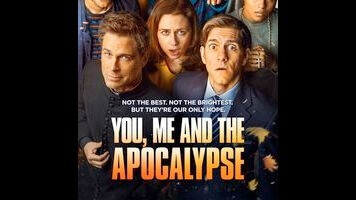The end of all things makes everything count. That’s why the apocalypse is storytelling catnip, the stuff of epic drama—mythical, religious, and human all at the same time. And for those brave (or stupid) enough to try, the apocalypse is also great fodder for comedy: Tremendous stakes, tons of tension, and a broad spectrum of character-based responses. While some dark comedies find their daring by laughing at a funeral, the burgeoning subgenre of shit-hits-the-fan-coms like The Last Man On Earth and the new British-American co-production You, Me And The Apocalypse crack wise at a worldwide wake.
Working on either side of the apocalypse coin, these series succeed by treating the subject matter with a certain reverent irreverence. The protagonists of You, Me And The Apocalypse aren’t blithe about the 8-mile-wide space rock hurtling toward their planet—they panic, they compose bucket lists, they scramble to reunite with lost loved ones. Already spinning a bizarre comedy-thriller mashup on a global stage, creator Iain Hollands pulls from a few more high-stakes, high-concept genres, integrating a few mistaken identities and a theological mystery fit for an airport paperback.
The former is a perfect match for star Mathew Baynton, whose Jamie Winton is more or less a reprise of the buttoned-down bloke Baynton played in the BBC’s Hitchcockian romp The Wrong Mans—right down to the guileless companion (Joel Fry as Dave, because James Corden only rides shotgun to Adele these days). Arrested on suspicion that he’s the leader of a vast, Anonymous-esque hacktivist collective (for good reason, it turns out), Jamie’s predicament links him to Rhonda McNeil (Jenna Fischer), an American librarian serving time for cyber crimes she didn’t commit. The meteor temporarily overshadows Jamie’s and Rhonda’s legal troubles, while creating a mess of work for Father Jude (Rob Lowe) and Sister Celine (Gaia Scodellaro), who take up a hefty assignment at the Vatican: Vetting potential messiahs (and, in turn identifying the antichrist).
Any one of those threads could be its own show, so You, Me And The Apocalypse doesn’t have much time for juggling lessons. The hour-long timeslot helps, as does the comparable weight of the three storylines. But a spoonful weighs a ton on judgment day, so Hollands and company make sure the remainder of their show lives up the significance of these of events. Even when they’re dropping punchlines, Lowe and Fischer never behave like characters in a comedy, and the production design mimics that of a big-screen apocalypse. A post-riot street actually looks like riot took place there; Jamie’s exodus is halted by a traffic jam that presumably stretches over from a nearby Roland Emmerich production. The pilot shows a real visual panache, too, color-coding its far-flung settings with cool blues and grays (Jamie’s 9-to-5 U.K.), ironically sunshiny yellow (Rhonda’s prison), and stately wood and marble surfaces (Jude and Celine’s Vatican chambers).
By now, it’s probably apparent that despite its humorous trappings, laughs aren’t You, Me And The Apocalypse’s highest priority. Background gags involving Dionysian excess abound, and the keyed-up performances by Fry and Megan Mullally (the latter diving head first into the role of a white-supremacist prison-gang leader) provide the absurd counterpoints to straight men Baynton and Fischer, but what really revs this show’s engine is a Big Idea. When one of your characters holds the historically based, now-defunct Catholic office of devil’s advocate, some philosophizing is bound to arise, and You, Me And The Apocalypse goes all in on chin-stroking debates between chance and fate and hope and despair. Lowe’s first scene finds Sister Celine interviewing for the job of Father Jude’s assistant, with the whole thing hinging on the proclamation that “There’s no faith without doubt”—and on this show, that goes for humans as well as gods.
You, Me And The Apocalypse uses that thoughtfulness as a hook, along with the curiosity piqued by the cold open, where the main characters all brace for the inevitable within the same underground bunker. The difference between where they all start out and where they all end up sustains the first two hours well enough, and the events of the second episode—which drops in on the White House’s official (and unofficial) response to the meteor—raises further questions about the characters’ intangible connections. It’s an enticing mystery, though the impatient can seek the answers online—the entire series has already aired in the U.K. And although the early chapters aren’t rip-roaring laugh riots, that only means the funny stuff—Jamie’s mother doing some zero-hour remodeling; Rhonda displaying her lack of criminal bona fides mid-looting—leaves a deeper impact.









































